

Viewcontent. The School Library versus the School Board: An Exploration of the Book Banning Trend of the 1980s. By Amy Pelman and Beverly Lynch Abstract While attempted book banning in school libraries continues to this day, a rash of book challenges occurred during the 1980s.
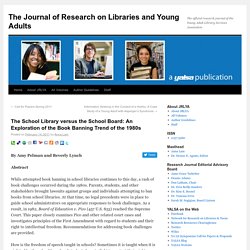
Parents, students, and other stakeholders brought lawsuits against groups and individuals attempting to ban books from school libraries. At that time, no legal precedents were in place to guide school administrators on appropriate responses to book challenges. As a result, in 1982, Board of Education v. How is the freedom of speech taught in schools? In the school library, parents, community members, or school board officials have encountered books that they believe kids should not read and have sought to have the books removed from the shelves. Island Trees School District Board of Education v. Pico. BOARD OF EDUCATION, ISLAND TREES UNION FREE SCHOOL DISTRICT NO. 26, ET AL., Petitioners, v.
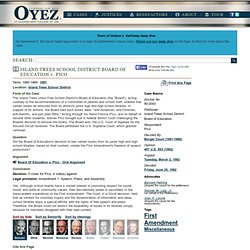
STEVEN A. PICO, BY HIS NEXT FRIEND, FRANCES PICO, ET AL. No. 80-2043 March 2, 1982 The above-entitled matter came on for oral argument before the Supreme Court of the United States at 12:58 o'clock p.m. GEORGE W. ALAN H. CHIEF JUSTICE BURGER: We will hear argument next in Board of Education against Pico and others. LexisNexis® Academic & Library Solutions. Opposing Viewpoints In Context - Document. Island trees Pico - Summon @ Pittsburg State University Library Services. Abstract The essays span [Pico Iyer]'s travels during the past decade to some of the most unlikely locales: from a Zendo retreat in the San Gabriel Mountains near Los Angeles to an English cemetery in Aden, Yemen, and to a "Tibetan" cafe on Easter Island on New Year's Eve.

But as incredible as Iyer's travels seem, the collected details are what make the accounts so impossibly real and so essentially human. Maybe most compelling, and certainly most unsettling, is Iyer's account of the sprawling Angkor Wat temple complex in Cambodia. Sown with land mines from the days of Pol Pot, Iyer's Angkor is haunted by contraband peddlers, amputees in broken wheelchairs and little girls with cataracts playing with monkeys on strings. With unforgiving sincerity, he writes, "Angkor was the shrill whine of cicada bells issuing from the trees, and the little girl who put a pink water-pistol in her mouth and pulled the trigger. " Publication Title Telegraph - Herald Publisher Telegraph Herald Copyright. First Amendment Schools: The Five Freedoms - Court Case. Cases and Codes. Cases citing this case: Supreme CourtCases citing this case: Circuit Courts.
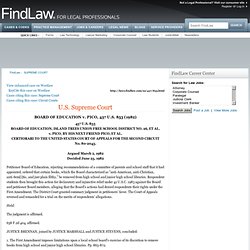
Home - Supreme Court of the United States. Board of Educ. v. Pico. First, the plurality argues that the right to receive ideas is derived in part from the sender's First Amendment rights to [p888] send them.
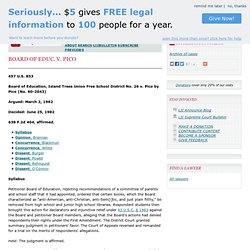
Yet we have previously held that a sender's rights are not absolute. Rowan v. Post Office Dept., 397 U.S. 728 (1970). [n4] Never before today has the Court indicated that the government has an obligation to aid a speaker or author in reaching an audience. the right to receive ideas is a necessary predicate to the recipient's meaningful exercise of his own rights of speech, press, and political freedom. Ante at 867 (emphasis in original). The plurality also cites Tinker, supra, to establish that the recipient's right to free speech encompasses a right to have particular books retained on the school library shelf. Whatever role the government might play as a conduit of information, schools in particular ought not be made a slavish courier of the material of third parties. 474 F.Supp. 387, 392 (1979). Epperson v. Dissent POWELL, J., Dissenting Opinion. Island Trees School District Board of Education v. Pico.
Island Trees School District v. Pico. Board of Education v.
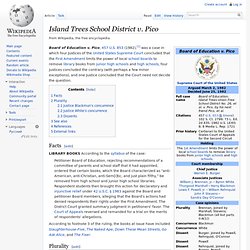
Pico, 457 U.S. 853 (1982),[1] was a case in which four Justices of the United States Supreme Court concluded that the First Amendment limits the power of local school boards to remove library books from junior high schools and high schools, four Justices concluded the contrary (with perhaps a few minor exceptions), and one Justice concluded that the Court need not decide the question. Facts[edit] LIBRARY BOOKS According to the syllabus of the case: Petitioner Board of Education, rejecting recommendations of a committee of parents and school staff that it had appointed, ordered that certain books, which the Board characterized as "anti-American, anti-Christian, anti-Sem[i]tic, and just plain filthy," be removed from high school and junior high school libraries.
Plurality[edit] No single opinion commanded a majority of the Court, or announced any legal binding rule. Justice Blackmun's concurrence[edit] Justice White's concurrence[edit] Dissents[edit] See also[edit]